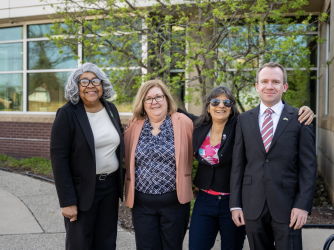Table of Contents
FIRE Files Friend-of-the-Court Brief with Eleventh Circuit in Augusta State University Case
FIRE has filed a friend-of-the-court brief with the United States Court of Appeals for the Eleventh Circuit in support of Augusta State University (ASU) graduate student Jennifer Keeton, who was required to complete "diversity sensitivity training" and additional remediation assignments after instructors learned of her religious beliefs. FIRE's brief, authored by noted First Amendment expert and University of California - Los Angeles law professor Eugene Volokh and joined by the National Association of Scholars, argues that imposing unique requirements on certain students because of their expressed viewpoints violates the First Amendment.
In our brief, we point out that singling out a student for "remediation" because of his or her beliefs is unjust. As Professor Volokh writes:
The First Amendment forbids such government retaliation based on a person's exercise of First Amendment rights. To prove retaliation, "private citizens" (as opposed to government employees) "must establish that the retaliatory acts would deter a person of ordinary firmness from exercising his or her First Amendment rights." Bennett v. Hendrix, 423 F.3d 1247, 1252 (11th Cir. 2005). Students of ordinary firmness would certainly be deterred from expressing their dissenting viewpoints if the cost of such expression is many hours of extra university imposed burdens, coupled with the risk of expulsion from the program.
Besides violating Keeton's own First Amendment rights, the university's retaliation also sent a powerful message to other students: If you express views like Keeton's, prepare to suffer the same consequences-prepare to incur many hours of extra obligations, and to put yourself at risk of expulsion. Just as campus speech codes that impose discipline for constitutionally protected speech unacceptably "inhibit [students] in expressing [their] opinions," "in class" and outside, so ASU's actions here likewise inhibited student expression.
In this respect, the university's actions are much like those of the State of Florida in Miami Herald Pub. Co. v. Tornillo, 418 U.S. 241, 94 S. Ct. 2831 (1974). There, Florida law required newspapers that published criticisms of candidates to also publish the candidate's reply. Tornillo defended the law on the grounds that the law "'ha[d] not prevented the Miami Herald from saying anything it wished,'" but the Court disagreed. The law, the Court held, "exacts a penalty on the basis of the content of a newspaper," a penalty that included the "cost in ... time" as well as in materials and space. Id. at 256-57, 94 S. Ct. at 2839. The Court continued:
Faced with the penalties that would accrue to any newspaper that published news or commentary arguably within the reach of the right-of-access statute, editors might well conclude that the safe course is to avoid controversy. Therefore, under the operation of the Florida statute, political and electoral coverage would be blunted or reduced. Government-enforced right of access inescapably "dampens the vigor and limits the variety of public debate."
Precisely the same is true here: The university's action "exacts a penalty on the basis of the content" of student speech, a penalty that includes the cost in time (likely more time than was usually required by the right-of-reply law in Miami Herald) as well as risk. Moreover, "[f]aced with the penalties that would accrue" to any student who made statements that could arguably be treated by the university as requiring "remediation," students "might well conclude that the safe course is to avoid controversy. Therefore, under the operation of the [University policy], [student commentary on controversial issues] would be blunted or reduced." "Government-enforced ['remediation' policies] inescapably 'dampen[] the vigor and limit[] the variety of [student] debate.'"
Finally, the university's actions sent another message as well: If you challenge the views that the administration seeks to inculcate, prepare to have even your private conversations with your classmates reported to the authorities, scrutinized for evidence of wrong thinking, and used as the basis for university retaliation. This creates the very sort of "atmosphere of suspicion and distrust" that the Supreme Court condemned in Sweezy v. New Hampshire, 354 U.S. 234, 250, 77 S. Ct. 1203, 1212 (1957).
(Citations and footnotes omitted; brackets in original.)
Keeton brought suit against Augusta State University in July with the assistance of the Alliance Defense Fund. In August, a federal district court judge denied Keeton's motion for a preliminary injunction to block Augusta State's imposition of its remedial plan on Keeton. FIRE will keep you updated on the progress of the case.
Recent Articles
FIRE’s award-winning Newsdesk covers the free speech news you need to stay informed.

VICTORY: Michigan town declares Sept. 6 ‘First Amendment Day’ after FIRE sues its mayor for shouting down residents

USC canceling valedictorian’s commencement speech looks like calculated censorship

Back into the FIRE: Hasen’s response to FIRE and Rohde: Don’t read the press clause out of the Constitution — First Amendment News 420
